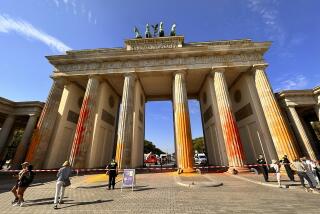East German Riot Police Clash With Thousands of Irate Demonstrators
- Share via
EAST BERLIN — Riot police used water cannon and rubber truncheons against thousands of angry East Germans in Dresden--many of them chanting support for Mikhail S. Gorbachev--in one of the worst nights of unrest communist East Germany has seen.
Witnesses and Protestant church sources said the huge crowd surged around the main railroad station Wednesday night, some intent on hitching a ride on trains carrying refugees from Prague to the West.
Raucous chants of “Gorby! Gorby!” rang through the streets as a small core of 40 demonstrators ripped up cobblestones and lobbed them at the police, who ducked behind riot shields and occasionally hurled stones back.
Reformist Soviet leader Gorbachev arrives in East Berlin on Friday to attend the country’s 40th-anniversary observance.
Police kept the mostly peaceful crowd out of the station and quelled the unrest at midnight after three hours by dousing people with water cannon and surging forward with rubber truncheons flailing.
Ambulances wailed through the streets of the elegant city on the Elbe River, reconstructed after devastating bombings in World War II. The sources reported injuries but had no details.
They also had no news of detentions during the unrest, the worst since riots over rock music in Leipzig during the 1960s.
Earlier a man fell beneath a train at the station and lost both legs, the sources said. It was not clear how he had breached the police cordon or whether he had been trying to board a train for Prague and thus reach the West.
Not all of those at the station wanted to join the “freedom trains” taking East Germans to the West from Bonn’s embassy in Prague, however.
“There was a general feeling of wanting to express dissatisfaction with the way things are going,” said one woman. People yelled, “ Perestroika! “ a reference to Gorbachev’s reform program, and sang the Internationale, the communist anthem.
Western diplomats saw a direct link between the Gorbachev visit and East Berlin’s decision to curb travel to Czechoslovakia, the last country East Germans could visit freely.
“This is the first riot we’ve had yet,” said one diplomat, referring to the buildup to the anniversary celebrations.
Another said: “I think the people are increasingly seeing the Gorbachev visit as their opportunity. First we had Leipzig and now we have Dresden. Who knows what will happen in Berlin?”
On Monday well over 10,000 East Germans marched through Leipzig calling for political change and the legalization of the main independent reform group New Forum.
More to Read
Sign up for Essential California
The most important California stories and recommendations in your inbox every morning.
You may occasionally receive promotional content from the Los Angeles Times.













